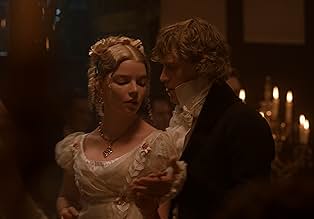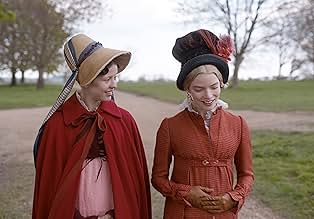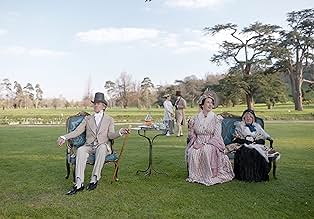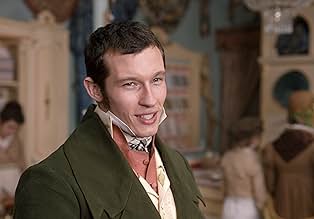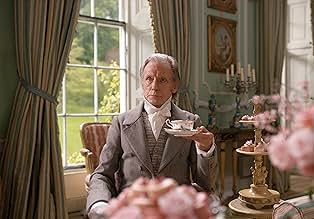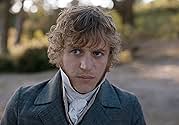Emma.
- 2020
- Tous publics
- 2h 4min
Dans l'Angleterre des années 1800, une jeune femme bien intentionnée mais égoïste se mêle de la vie amoureuse de ses amis.Dans l'Angleterre des années 1800, une jeune femme bien intentionnée mais égoïste se mêle de la vie amoureuse de ses amis.Dans l'Angleterre des années 1800, une jeune femme bien intentionnée mais égoïste se mêle de la vie amoureuse de ses amis.
- Réalisation
- Scénario
- Casting principal
- Nommé pour 2 Oscars
- 8 victoires et 53 nominations au total
Avis à la une
I saw this before seeing the Queen's Gambit, so I wasn't yet won over to the brilliance of anya taylor joy. This film did not win me over at the time. I thought she came across as overly haughty and disconnected. You may say that Emma is meant to be an un-likeable character, and that may be true, but I think a truer version of Emma would be of a young woman whom we know has lost her way and who is treating people less than honourably, but who is doing so because of her own fears and insecurities and who journeys through the course of the story to understand this more and to endeavour to be better in the future. There should be an empathetic and redemptive aspect to her despite her meanness. This was wholly lacking in this. And I now think it is far more about the production than taylor joy's portrayal. The film was overly focussed on looking good and missed connecting the characters with the audience. It reminds me of Bridgerton in that all the time and effort was spent on making things look great but the characters are pretty lifeless. Johnny Flynn was the best I thought he got the personality of Mr Knightley really well, but again the production didn't allow this to come through as well as it might. I really respect the attempt to bring Austen to modern audiences, I am not a purist, however this just regretfully isn't a great adaptation of the story nor a great movie. Watch the Romola Garai version of Emma.
This recent film rendition of Jane Austen's Emma (curiously here called "Emma." With a period) enjoyably carries the opulence of the 19th century landed gentry with a modernist modicum of biting satire. This vintage Austen is critical of the heavy-handed social manipulations toward marriage while it exudes Austen's own marriage to the time. As Virginia Woolf said, Austen "had no wish for things to be other than they are."
Slyly played by Anya Taylor-Joy, Emma's major duty in life seems to be placing her loved ones in the right marriage, occasionally delighting in a working-class connection. To her credit she seems to value love even above wealth, though her being poor herself is never an option as long as her wispy father (Bill Nighy) is responsible for her welfare: "Never could I expect to be so truly beloved and important; so always first and always right in any man's eyes as I am in my father's." (Emma)
Taylor-Joy brings a sly smile to most interchanges, as if it were Austen herself enjoying the charades and deceptions that she knows her story will set right as she sets right the appropriate human connections. The audience is always in the know as young director Autumn de Wilde gives the feel of Austen's signature style, Free Indirect Speech (FIS), a form of third-person narration which goes gently in and out of a character's mind.
More importantly, the mansion and its grounds are about as lush and painterly as ever has been shown on a period piece, and the costumes are beyond breathtaking. If you are put off by the high rhetorical style, your eye will be fully satisfied with a sumptuousness rarely seen in cinema.
When all is said, however, its live that defines this kind of romance. Johnny Flynn as George Knightly, Emma's close buddy and potential suitor, is real enough in a Steve-McQueen way to bring that modernist cadence to the stiff upper-crust motif. He and Taylor-Joy are well matched, youthful, beautiful, and hip.
De Wilde and writer Eleanor Catton have done Austen well, carrying the aura of 19th century upper-class reserve into our cynical times, attractive enough to make us think that love can be organized and life made simple. The women in Emma., even when foolish, are worthy of affection:
"Men of sense, whatever you may choose to say, do not want silly wives." Mr. Knightly
Slyly played by Anya Taylor-Joy, Emma's major duty in life seems to be placing her loved ones in the right marriage, occasionally delighting in a working-class connection. To her credit she seems to value love even above wealth, though her being poor herself is never an option as long as her wispy father (Bill Nighy) is responsible for her welfare: "Never could I expect to be so truly beloved and important; so always first and always right in any man's eyes as I am in my father's." (Emma)
Taylor-Joy brings a sly smile to most interchanges, as if it were Austen herself enjoying the charades and deceptions that she knows her story will set right as she sets right the appropriate human connections. The audience is always in the know as young director Autumn de Wilde gives the feel of Austen's signature style, Free Indirect Speech (FIS), a form of third-person narration which goes gently in and out of a character's mind.
More importantly, the mansion and its grounds are about as lush and painterly as ever has been shown on a period piece, and the costumes are beyond breathtaking. If you are put off by the high rhetorical style, your eye will be fully satisfied with a sumptuousness rarely seen in cinema.
When all is said, however, its live that defines this kind of romance. Johnny Flynn as George Knightly, Emma's close buddy and potential suitor, is real enough in a Steve-McQueen way to bring that modernist cadence to the stiff upper-crust motif. He and Taylor-Joy are well matched, youthful, beautiful, and hip.
De Wilde and writer Eleanor Catton have done Austen well, carrying the aura of 19th century upper-class reserve into our cynical times, attractive enough to make us think that love can be organized and life made simple. The women in Emma., even when foolish, are worthy of affection:
"Men of sense, whatever you may choose to say, do not want silly wives." Mr. Knightly
Recently got a chance to watch this. I like the film with Gwyneth Paltrow, and absolutely love the BBC miniseries, so I was cautious watching this, especially with the several bad reviews. I don't know if it was because I went in with low expectations, but I was delighted by this movie! Admittedly if you don't know the story, it can move fast, but to be fair, the book is long and tedious, with a lot to fit in two hours, which is one of my problems with the 2008 movie. The visuals and fashions of this movie are beautiful, and Emma's character did show improvement unlike some of the comments I saw. This one definitely captured Jane Austen's humor, and you can be guaranteed to laugh a few times. The BBC mini-series is still my top rated, but the 2020 "Emma." is, in my opinion, a notch above the 2008 "Emma", but would definitely recommend all adaptations, especially the book.
Based on a timeless novel Emma by Jane Austen, this latest movie adaptation of her book is a beautiful, gorgeous and entertaining re-make that should easily please Austen fans old and new as it looks phenomenal. Its cast, led by the terrific and wonderful Anya Taylor-Joy, are/is utterly splendid. "Emma's" script is adapted by novelist Eleanor Catton (The Luminaries) and manages to capture much of Austen's own comedy, translating it elegantly to the screen. The result is a stylish and eminently watchable movie adaptation. In addition to the script, the production values are stellar, while movie is visually stunning and impeccably researched - it really felt like an authentic window into the 1800s. At the end, film - updated in all the right ways - is filled with an abundance of genuine charm. For those who are fans of the period drama this is a must see, while this gentle film, also, deserves to introduce Austen to a whole new generation.
Rating: 7+/8-
Rating: 7+/8-
This was the last movie my wife and I saw in the actual theater-- back in March 2020 -- just days before covid-19 lockdown began. As of July we're wondering when we'll ever get to see another. In the meantime we've acquired a big UHD TV and subscriptions to a bunch of streaming services. But there's still nothing to match watching on a big screen with a packed audience of engaged viewers.
Anyway: long before there was "Mean Girls" and "Clueless", there was Jane Austen's novel about a good-hearted but manipulative, un-self-aware young woman who has a great deal of learning to do about real people. This most recent version of "Emma" is very nice and certainly worth seeing in whatever format. I think it's neither better nor worse than the good 1996 version (the one with Gwyneth Paltrow in the title role) -- they both have fine production values and fine casts, just different emphases, shadings of the various characters, and the choices for cuts made to the story to make it fit into a normal 2-hour run time. Anya Taylor-Joy is not only a good, distinctively featured young actress but she also *looks* as young as Jane Austen's heroine is intended to be, about age 20. She has the (often baseless) self-confidence arising from a privileged, untroubled upbringing, but a journey of self-discovery awaits her, and that's what makes the story.
Other standout characters include Mia Goth, who plays friend/protegee Harriet Smith as even more of a hapless stooge than usual; and the incomparable Bill Nighy as Emma's father Mr. Woodhouse. Is he really just a hypochondriac always fussing over cold drafts and fireplaces? It becomes clear that he knows and sees a good deal more than his loving but blithely unobservant daughter gives him credit for. And Nighy can steal scenes without saying a word, just by body posture and a raised eyebrow. He's a cinematic treasure. Johnny Flynn as Mr. Knightley is fine but a bit forgettable in the end.
And the scenery. It's so lush and green and bright that you have to consciously shake yourself to realize that no, the English countryside is really NOT always warm and sunlit as it is here. But this is fiction, and it just helps us settle in and enjoy the comfortable ride through this classic tale. For the best screen version of Emma out there, though, I happily recommend the 2009 TV miniseries starring Romola Garai. She's perfect for the part, and its 4-hour length lets the full story expand and breathe the way it should.
Anyway: long before there was "Mean Girls" and "Clueless", there was Jane Austen's novel about a good-hearted but manipulative, un-self-aware young woman who has a great deal of learning to do about real people. This most recent version of "Emma" is very nice and certainly worth seeing in whatever format. I think it's neither better nor worse than the good 1996 version (the one with Gwyneth Paltrow in the title role) -- they both have fine production values and fine casts, just different emphases, shadings of the various characters, and the choices for cuts made to the story to make it fit into a normal 2-hour run time. Anya Taylor-Joy is not only a good, distinctively featured young actress but she also *looks* as young as Jane Austen's heroine is intended to be, about age 20. She has the (often baseless) self-confidence arising from a privileged, untroubled upbringing, but a journey of self-discovery awaits her, and that's what makes the story.
Other standout characters include Mia Goth, who plays friend/protegee Harriet Smith as even more of a hapless stooge than usual; and the incomparable Bill Nighy as Emma's father Mr. Woodhouse. Is he really just a hypochondriac always fussing over cold drafts and fireplaces? It becomes clear that he knows and sees a good deal more than his loving but blithely unobservant daughter gives him credit for. And Nighy can steal scenes without saying a word, just by body posture and a raised eyebrow. He's a cinematic treasure. Johnny Flynn as Mr. Knightley is fine but a bit forgettable in the end.
And the scenery. It's so lush and green and bright that you have to consciously shake yourself to realize that no, the English countryside is really NOT always warm and sunlit as it is here. But this is fiction, and it just helps us settle in and enjoy the comfortable ride through this classic tale. For the best screen version of Emma out there, though, I happily recommend the 2009 TV miniseries starring Romola Garai. She's perfect for the part, and its 4-hour length lets the full story expand and breathe the way it should.
Le saviez-vous
- AnecdotesAll of the music performances in the film are real, played by the actors in character. None is staged.
- GaffesThe Sequence subtitled Winter begins with a carriage drawing up in front of a large tree in full leaf.
- Citations
Miss Bates: Mother, you MUST sample the tart!
- Crédits fousThe film's title has a period at the end, meant to signify the movie as a "period piece" set in the original era.
Meilleurs choix
Connectez-vous pour évaluer et suivre la liste de favoris afin de recevoir des recommandations personnalisées
- How long is Emma.?Alimenté par Alexa
Détails
- Date de sortie
- Pays d’origine
- Site officiel
- Langue
- Aussi connu sous le nom de
- Emma
- Lieux de tournage
- Sociétés de production
- Voir plus de crédits d'entreprise sur IMDbPro
Box-office
- Budget
- 10 000 000 $US (estimé)
- Montant brut aux États-Unis et au Canada
- 10 055 355 $US
- Week-end de sortie aux États-Unis et au Canada
- 234 482 $US
- 23 févr. 2020
- Montant brut mondial
- 25 932 444 $US
- Durée2 heures 4 minutes
- Couleur
- Mixage
- Rapport de forme
- 1.85 : 1
Contribuer à cette page
Suggérer une modification ou ajouter du contenu manquant








